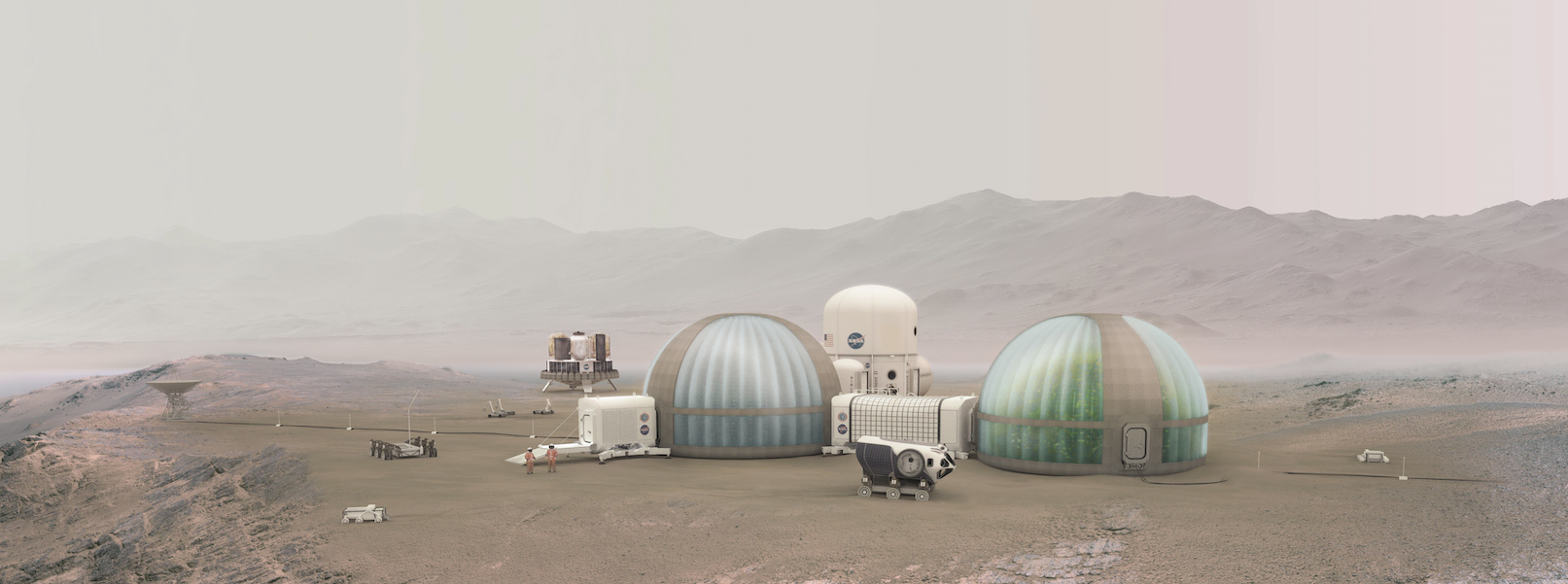- Undergraduate
Bachelor's Degrees
Bachelor of ArtsBachelor of EngineeringDual-Degree ProgramUndergraduate AdmissionsUndergraduate Experience
- Graduate
Graduate Experience
- Research
- Entrepreneurship
- Community
- About
-
Search
All Thayer News
 Artist’s rendering of an early Martian outpost showing a Mars Ice Home and potential complementing greenhouse. Image courtesy of Clouds AO.
Artist’s rendering of an early Martian outpost showing a Mars Ice Home and potential complementing greenhouse. Image courtesy of Clouds AO.
Grow Kale on Mars? Dartmouth Team Will Show NASA How
Apr 16, 2019
Engineering students are one of five finalists in NASA's BIG Idea Challenge
 Artist’s rendering of an early Martian outpost showing a Mars Ice Home and potential complementing greenhouse. Image courtesy of Clouds AO.
Artist’s rendering of an early Martian outpost showing a Mars Ice Home and potential complementing greenhouse. Image courtesy of Clouds AO.Dartmouth engineering students will head to NASA’s Langley Research Center next Tuesday to pitch a Mars greenhouse concept that has the potential to grow enough crops to sustain a small human colony.
As one of five finalists for NASA’s 2019 Breakthrough, Innovative, and Game-changing (BIG) Idea Challenge, the Dartmouth team will have the opportunity to propose a solution to a real-time challenge for NASA as it explores a human mission to Mars. The winning team will have a shot at landing a coveted internship at NASA this summer.
The Dartmouth engineering team's pitch will be live-streamed on Tuesday, April 23, starting at 10:15am.
For the challenge, the team had to consider not only how crops could grow in a hostile Mars environment, but also how the greenhouse structure could be transported millions of miles from Earth, then deployed and sustained with limited technology and resources. The students chose eight hardy food crops—kale, soy, sweet potato, potato, broccoli, strawberry, wheat, and chufa—to grow in a rotating nutrient-filled hydroponic system and provide enough nourishment for a four-person crew on a 600-day surface mission to Mars. The greenhouse complements the structure of the Mars Ice Home, which was designed as part of a Mars feasibility study by NASA in 2016 in collaboration with SEArch and Clouds AO.
The BIG Idea Challenge supports NASA’s Game Changing Development program to rapidly bring to fruition high-impact technologies. The challenge, organized jointly by NASA and the National Institute of Aerospace (NIA), is open to teams of undergraduate and graduate students studying in fields applicable to human space exploration. In return, NASA taps students for ideas that scientists at NASA may not have considered.
The Dartmouth team of BE students—led by Zoe Rivas ’18 and Alexa Escalona ’18 and comprised of David Dick, Grace Genszler, Thomas Hodsden ’18, Peter Mahoney ’19, Morgan McGonagle ’18, and Christopher Yu ’19—will compete against teams from: MIT; University of California , Davis; University of Colorado, Boulder, with Harvard, Cornell, and University of Hawaii, Manoa; and the University of Michigan with Pennsylvania State University, Purdue University, and the University of Wisconsin, Platteville.
For contacts and other media information visit our Media Resources page.
